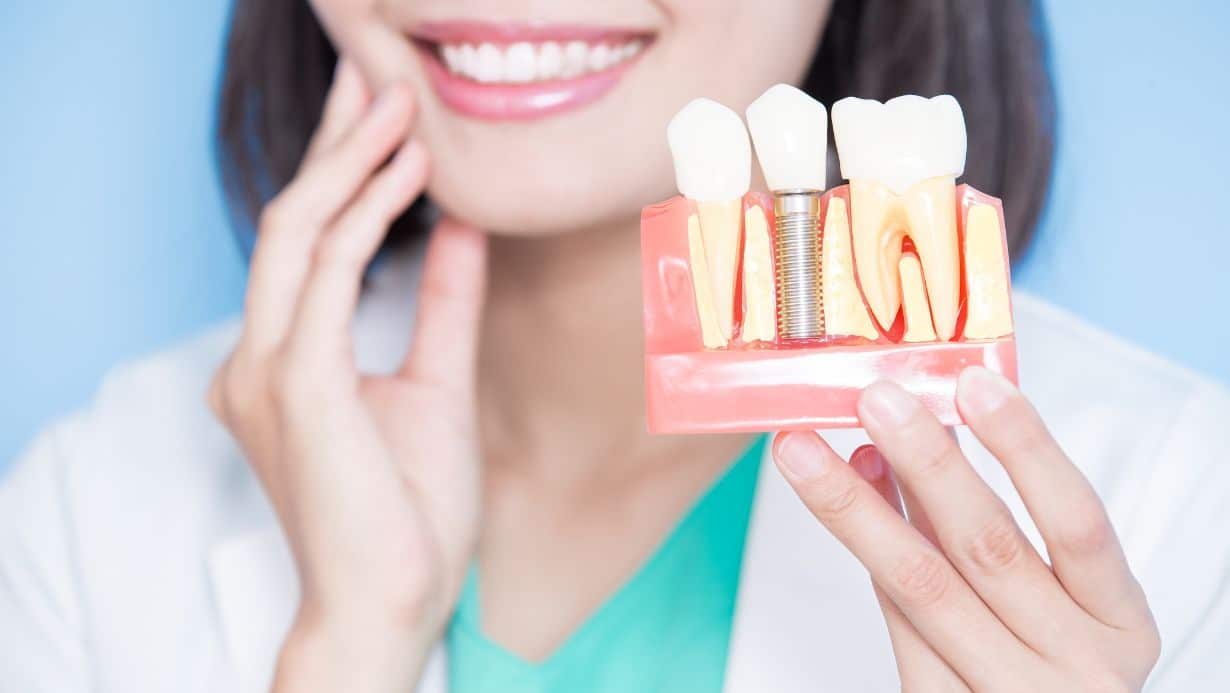Dental implants are a remarkable solution for replacing missing teeth, offering stability, functionality, and aesthetics akin to natural teeth. However, the journey to enjoying your new smile doesn’t end with implant surgery. Proper post-implant care plays a pivotal role in ensuring the success of the procedure and maximizing the lifespan of your dental implants.
Join Dr. Vikram Pandit – BDS, MDS (Oral and Maxillofacial Surgery), a distinguished dental implant specialist in Pune, as he guides you through immediate recovery, long-term maintenance routines, and daily habits that impact implant longevity.
Immediate Aftercare Tips
In the immediate period of your dental implant surgery, it’s essential to prioritize your recovery and follow specific guidelines to promote good healing:
Pain Management:
- Medication: While some discomfort is normal after surgery, your implant dentist Dr. Vikram Pandit will tailor a plan to manage discomfort, including over-the-counter medications like ibuprofen/acetaminophen or stronger pain medication options such as narcotic medications, only if needed.
- Ice packs: Apply intermittent ice packs to your cheek for 15-minute intervals during the first 24 hours to reduce swelling and discomfort.
- Elevation: Sleep with your head elevated with extra pillows, which helps reduce swelling and blood flow to the surgical site.
Diet:
Your diet plays a significant role in your recovery process.
- Soft foods: For the first few days, stick to soft, cool foods like mashed chapati, yogurt, rice preparations, and smoothies. Avoid anything hot, spicy, or hard that could irritate the implant site and stitches.
- Chewing: Avoid chewing directly on the implant site. Use the opposite side of your mouth for chewing.
- Hydration: Drink plenty of water to stay hydrated and aid healing. Avoid sugary drinks and alcohol, which can slow healing and irritate the site.
Oral Hygiene:
Proper oral hygiene is essential for preventing infections and ensuring the success of your dental implants.
- First 24 hours: Avoid rinsing or spitting vigorously, as this can dislodge blood clots and delay healing. Gently dab the area with gauze soaked in cool water.
- Day 2 onwards: Begin gentle brushing with a soft toothbrush and lukewarm salt water rinse (½ teaspoon salt in a glass of warm water) 3-4 times daily. Avoid directly brushing the implant site for the first few days.
Rest and Recuperation:
Your body needs time to heal.
- Avoid strenuous activity: Avoid strenuous exercise, heavy lifting, and anything that could raise your blood pressure for at least 24-48 hours after surgery.
- Rest: Prioritize getting plenty of sleep every day (7-8 hours) to aid healing and reduce swelling.
- Smoking: Smoking can hinder healing and increase the risk of infection. Avoid smoking for at least two weeks after surgery, ideally longer.
Follow-up Appointments:
Scheduled follow-up appointments with your oral and maxillofacial surgeon Dr. Vikram Pandit are critical for monitoring your healing progress and addressing any concerns that may arise. During these appointments, your implant dentist will assess the stability of your dental implants and ensure that everything is progressing as expected. Don’t hesitate to contact your dental implant specialist if you experience excessive pain, swelling, bleeding, or any other unusual symptoms.
Long-Term Maintenance of Implants
Now that you’re enjoying the benefits of your dental implants, it’s time to shift focus to long-term maintenance. Think of it as nurturing your smile’s investment! By incorporating simple yet crucial steps into your daily routine, you can ensure your implants thrive for years to come.
Daily Care Routine: The Foundation of Lasting Success
Just like natural teeth, implants require gentle yet consistent care. Here are the key elements:
- Brushing with Love: Twice daily, embrace a soft-bristled toothbrush and a low-abrasive toothpaste. Remember, these aren’t your average teeth – they appreciate a gentler touch! Don’t forget your tongue, which harbors bacteria that can contribute to gum health issues.
- Flossing: Your Secret Weapon: Flossing regularly removes plaque and debris from those tricky spaces between implants and natural teeth, where even the best brushing might miss. Traditional floss works well, but consider interdental brushes or water flossers for even more precision. Remember, clean implants are happy implants!
Choosing the Right Mouthwash: Your Personalized Ally
Mouthwash can be your secret weapon in the fight against plaque and bacteria around your implants. But with so many options, choosing the right one can feel overwhelming. Don’t worry, I’m here to help!
The Power Players:
- Antimicrobial: These target harmful bacteria around implants and gums, keeping things squeaky clean.
- Fluoride: This acts as a shield for your natural teeth, strengthening enamel and preventing cavities.
- Alcohol-free: These are gentler on sensitive tissues and avoid that drying-out feeling.
Finding Your Perfect Match:
There’s no one-size-fits-all solution. During your regular check-ups, we can discuss your individual needs, like gum health, sensitivity, and desired level of germ-fighting power, to find the perfect mouthwash for your smile.
Peri-Implantitis: Recognizing and Preventing Complications
Peri-implantitis, similar to gum disease, is an inflammation of the soft tissue surrounding the implant. Left unchecked, it can lead to bone loss and even implant failure. But fear not! With knowledge and proactive measures, we can prevent it.
Know the Enemy: Poor oral hygiene, smoking, and certain health conditions can create an environment where peri-implantitis thrives.
Be Alert: Watch out for any signs like pain, bleeding, redness, swelling or discomfort around the implant area. These are your body’s early warning signs!
Prevention is Key:
- Regular Check-ups: Think of your regular dental check-ups as your shield against peri-implantitis. These allow me to detect early signs and intervene before they cause trouble.
- Meticulous Hygiene: Remember your daily brushing and flossing? They’re your swords in this fight! Following my specific instructions for implant care is crucial for keeping those pearly whites sparkling.
Staying Vigilant: Monitoring and Addressing Concerns
Now that you’re well on your way to enjoying your new implants, it’s crucial to stay vigilant and monitor their health. Regular maintenance and awareness are key to ensuring your smile remains vibrant and healthy for years to come!
Regular Check-ups: Your Guardian Angels
Just like your car needs regular tune-ups, your implants benefit from scheduled visits with our dental team. These check-ups are your guardian angels, helping detect and address any potential issues early on before they snowball. Think of them as preventive maintenance for your smile!
Depending on your individual needs, we recommend visits every 3-6 months. During these appointments, we thoroughly examine your implants, gums, and overall oral health and take X-rays if needed ensuring everything is functioning as it should.
Even the most diligent brusher can miss hidden nooks and crannies. Professional cleanings go the extra mile, removing stubborn plaque and tartar buildup that can contribute to implant problems.
Recognizing Warning Signs: Be Your Smile’s Detective
While dental implants are incredibly durable, just like any natural tooth, they require your vigilance. Be mindful of any signs that might indicate a potential issue, such as:
- Pain or discomfort around the implant site.
- Looseness or mobility of the implant.
- Changes in your bite or chewing sensation.
- Inflammation or bleeding around the implant.
Remember, the sooner you bring any concerns to our attention, the faster we can address them and ensure your implants continue to thrive.
Lifestyle Habits: Making Healthy Choices for Your Implants
Now, let’s talk about some lifestyle choices that play a significant role in the long-term health of your implants:
- Smoking: This is a big one! Smoking significantly increases the risk of implant failure. If you’re a smoker, quitting is the best decision you can make for your overall health and your implants.
- Bruxism (teeth grinding): If you grind or clench your teeth at night, you might need a night guard to protect your implants from damage. We can discuss different options to find the perfect fit for you.
- Dietary Considerations: While you can enjoy all your favorite foods with implants, limiting sugary drinks and sticky snacks can help prevent plaque buildup. Additionally, avoiding excessive chewing on hard items can protect your implants from potential damage.
Cultivating a Smile That Lasts
Investing in dental implants is a decision that can transform your life, offering renewed confidence, improved oral health, and a beautiful smile you can cherish for years to come. But remember, just like any precious investment, your implants require dedication and care.
By following the simple yet essential steps outlined in this guide, you’ll become an active participant in the longevity and success of your implants. From incorporating gentle yet effective daily routines to prioritizing regular check-ups and being mindful of lifestyle choices, you’ll be creating a foundation for a healthy, vibrant smile that lasts a lifetime.
Remember, I’m not just your implant surgeon, I’m your partner in oral health, committed to providing personalized care and ensuring your satisfaction every step of the way.
If you have any questions or would like to schedule a consultation with our dental implant specialist in Pune, Dr. Vikram Pandit, please don’t hesitate to reach out on +91-7888229284.
Meet the Doctor
BDS, MDS Oral & Maxillofacial Surgeon
Dr. Vikram is a visiting consultant and consultant oral and maxillofacial surgeon at the top hospitals in Pune like Poona Hospital and Research Centre, Ratna Memorial Hospital, Pandit Clinic and KEM Hospital. Dr. Vikram has done clinical fellowship in craniofacial surgery with focus on surgery for cleft lip and palate deformities, orthognathic surgery and surgery for sleep related disordered breathing (SRDB). He has trained for advanced management for Facial Trauma, from Taiwan. He has also attended various seminars and done workshops related to Oral and Maxillofacial Surgery. Dr. Vikram is also a co- author of a chapter for a textbook. He has been invited as a speaker for number of conferences in India as well as Internationally.
You Might Be Interested In

What To Consider For Laser Hair Reduction
Laser hair reduction has become a popular choice for those seeking a long-term and permanent hair removal solution for unwanted hair. As a dermatologist, I

Laser Hair Removal – Benefits, Preparation, Process & Results
Laser Hair Removal is a cosmetic treatment that harnesses laser beams to target hair follicles and remove unwanted body hair efficiently and effectively. Laser Hair









